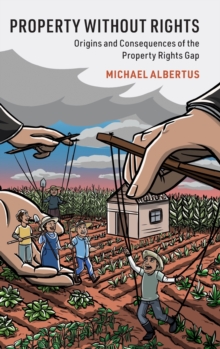Description
| Product ID: | 9781108835237 |
| Product Form: | Hardback |
| Country of Manufacture: | US |
| Series: | Cambridge Studies in Comparative Politics |
| Title: | Property without Rights |
| Subtitle: | Origins and Consequences of the Property Rights Gap |
| Authors: | Author: Michael Albertus |
| Page Count: | 416 |
| Subjects: | Ethnic studies, Ethnic studies, Comparative politics, Comparative law, Property law: general, Comparative politics, Comparative law, Property law |
| Description: | Select Guide Rating Incomplete rural property rights are endemic throughout most of the developing world. This book explores the political origins of this lack of rights and how it negatively impacts rural autonomy and development outcomes such as economic growth, inequality, urbanization, education, and the links between political parties and voters. Major land reform programs have reallocated property in more than one-third of the world''s countries in the last century and impacted over one billion people. But only rarely have these programs granted beneficiaries complete property rights. Why is this the case, and what are the consequences? This book draws on wide-ranging original data and charts new conceptual terrain to reveal the political origins of the property rights gap. It shows that land reform programs are most often implemented by authoritarian governments who deliberately withhold property rights from beneficiaries. In so doing, governments generate coercive leverage over rural populations and exert social control. This is politically advantageous to ruling governments but it has negative development consequences: it slows economic growth, productivity, and urbanization and it exacerbates inequality. The book also examines the conditions under which subsequent governments close property rights gaps, usually as a result of democratization or foreign pressure. |
| Imprint Name: | Cambridge University Press |
| Publisher Name: | Cambridge University Press |
| Country of Publication: | GB |
| Publishing Date: | 2021-01-07 |


